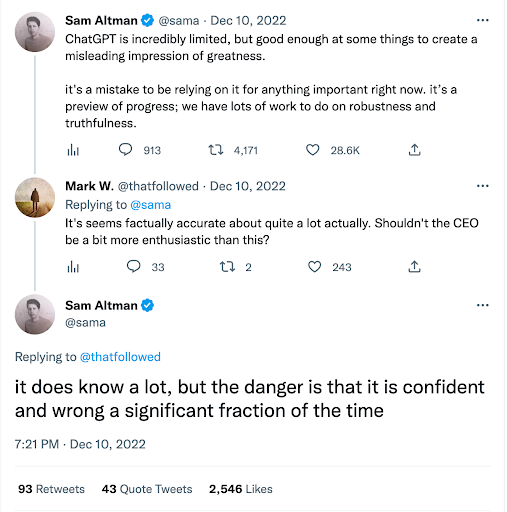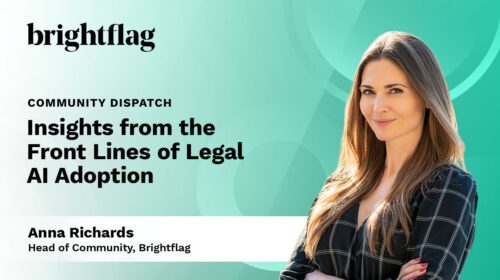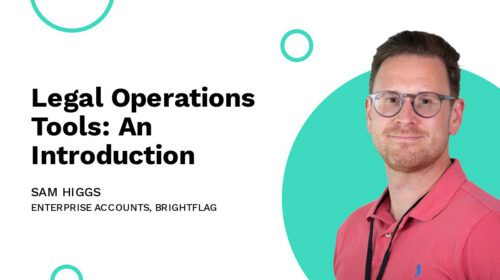ChatGPT Offers Reminder of AI’s Rightful In-House Legal Role
Most technologies achieve mainstream adoption in the same way Hemingway once described the onset of bankruptcy: “Gradually, and then suddenly.” Five years from now, we may very well view the release of ChatGPT as a pivotal transition point, when the impact of AI on corporate legal departments began to take shape.
Artificial Intelligence: Too Impactful to Ignore
AI has been gradually demonstrating its legal industry utility for more than a decade. In-house legal teams, in particular, have already tapped AI solutions to assist with:
- Facilitating case research
- Drafting contract clauses
- Detecting billing violations
- Predicting litigation outcomes
- Forecasting budget overruns
- Automating document review
So why did ChatGPT suddenly cause a frenzy in the corporate legal community?
My best guess is that many were surprised to see how well the technology handled tasks most attorneys assumed would be forever safe from the threat of “replacement by robot.”
AI helping with eDiscovery? That felt inevitable. AI passing the bar exam, negotiating discounts, and defending Supreme Court rulings? That felt different.
Upon closer inspection, the quality of ChatGPT’s outputs clearly falls below the level of a licensed attorney. But its ability to supply more-than-plausible answers in a matter of seconds has left many lawyers anxiously wondering whether their basic assumptions about the impact of AI on legal departments were off the mark by a decade or more.
The gradual uptake of AI-powered legal ops solutions in recent years has already given us ample evidence to suggest that the rewards are worth the investment. While AI tools may have real limitations, but the limitations on what in-house legal teams can deliver using strictly human resources are just as real. Thanks to these tools, in-house legal teams are now achieving their ideal state — one where lawyers have the time and insight necessary to excel at the creative, strategic, and impactful tasks they (and their business stakeholders) value most.
A.I. is Made to be Mentored
It’s difficult to overstate AI’s potential for sparking positive changes within corporate legal operations. It’s also irresponsible not to state a few important caveats.
For a concise summary of the technical limitations I alluded to earlier, look no further than the humans behind ChatGPT. Here’s what OpenAI CEO Sam Altman volunteered via Twitter:

What in-house legal teams need to remember is that all software solutions involving AI and machine learning are:
1) Intentionally designed for continuous improvement
2) Ultimately dependent on thoughtful human instruction
That’s why the development methodology described on ChatGPT’s website was so familiar to Brightflag’s engineers. The OpenAI team is building the same kind of learning loops that help our software accurately analyze legal services. The differences are mainly a matter of scope and specialization—ChatGPT develops wide-ranging, versatile solutions by training its AI using the entire internet, whereas Brightflag’s more focused application for corporate legal services requires just one content type for training: legal invoices.
As for the humans guiding the AI training exercises behind ChatGPT, we don’t have enough information to assess their qualifications. But on our side, we knew we needed to prioritize domain expertise in order to create a useful and reliable product for the corporate legal community. That’s why licensed lawyers have always been the primary source of feedback and instruction in our machine learning models—with just a few data scientists like myself supplying technical support.
Finally, to borrow some phrasing from Mr. Altman, it will take a considerable amount of time for any AI solution to reach a level of robustness and truthfulness that in-house legal teams can implicitly trust. Until it reaches that point, the impact of AI on legal departments will be muted. Training methods not only have to be of excellent quality, they have to be delivered at massive scale as well—for perspective, we’ve been iterating every day since 2014.
The Same, Only More So
I think ChatGPT will be remembered as more of a cultural inflection point than a true technical breakthrough, because it’s really just one captivating example of commonly employed engineering principles. But I also hope that we’ll come to regard it as exactly what was required to broaden in-house legal awareness of a few established truths:
- AI excels where human attention often fades — routine, repetitive tasks
- AI augments, rather than replaces, the wisdom of human experts
- AI training methods modulate the quality and utility of AI outputs
With these truths in mind, we can better recruit AI to play valuable supporting roles within our professional organizations.
If you’re interested in learning more about how you can add AI to your professional tool belt and leverage its capabilities to manage legal spend, be sure to book a demo with our team.



